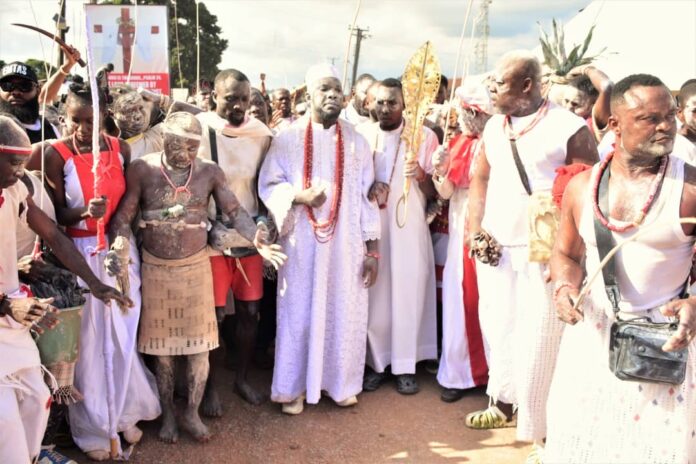Ubulu-Uku: The ancient Ubulu-Uku Kingdom in Aniocha South Local Government Area of Delta State was filled with colour, rhythm, and joy as indigenes trooped out in their numbers to celebrate the 2025 Iwu Festival, one of Anioma’s most revered cultural events.
Leading the two-day celebration was Chief Asika Onwordi, the Onishe Ezemu (Traditional Prime Minister) of Ubulu-Uku Kingdom, who turned this year’s Iwu Festival into a grand cultural carnival that showcased the community’s rich heritage, unity, and spirituality.
The festival began with an electrifying display of traditional dances, songs, and rituals as the Onishe Ezemu, adorned in full royal regalia, led other chiefs and residents in a colourful procession across the town. Men, women, and youths danced through the streets, their bodies covered in white chalk and sacred mud, symbols of purity and peace.
Drummers and singers filled the air with ancestral rhythms, chanting war songs and praises that echoed through the community.
Describing the festival, Chief Asika Ibori Onwordi called it Ubulu-Uku’s Christmas celebration a season that unites the people, restores peace, and renews spiritual bonds. The Iwu Festival is a time of reconciliation and peace, he said.
It brings everyone together no matter their differences to dance, forgive, and celebrate as one family.
For centuries, the Iwu Festival has been held to purify the land, thank the gods for a bountiful harvest, and usher in a new year of blessings. Each quarter including Udo, Agbonta, Onitcha, Ogbe-Ego, Abu-edo, Aku, and Isho took turns paying homage at the Ezeiwu Shrine, chanting Iwu! Iwu! Iwu! as they danced in excitement.
Chief Ibori explained that the festival promotes harmony between humans and the spiritual
Every part of Ubulu-Uku has its unique song and dance, performed only during Iwu. The festival features traditional instruments like the Agogo (gong), Ekwe (wooden drum), and Akpele (flute).
Principal participants include the Ohene (Chief Priest), Eze-Iwu, and Enem, all dressed in white and red attire.
Their bodies are decorated with Nzu (native chalk), symbolizing purity and connection to the ancestors.
Songs are also used to praise the community’s heroes and criticize wrongdoers, serving as both celebration and moral lesson.
The Iwu Festival is marked by strict traditions no one wears shoes on sacred grounds, and native chalk must be applied to every participant’s body.
A major highlight is the wrestling competition, where young men display strength and courage in friendly contests that once served as a rite of passage. Afterward, families and friends share local delicacies and palm wine late into the night — an expression of unity and generosity.
The most spiritual part of the festival is the Otito ritual, where the Eze-Iwus and the Chief Priest journey to the Mkpitime River to fetch sacred water in earthen pots. The water, carried back to the Obi of Ubulu-Uku’s palace, symbolizes renewal and cleansing of the land. Failure to return with it, tradition warns, brings grave consequences.
The festival concludes with the Idune-Iwu ceremony — a closing ritual led by the Onishe and the Chief Priest to bless the land with peace, fertility, and prosperity.
Chief Asika Ibori Onwordi emphasized that the Iwu Festival is not just an event but a bridge between generations.
Once the festival is held, the land is purified, he said. We thank the gods for the harvest and pray for peace, progress, and blessings in the year ahead.
As the final drumbeats faded, one message echoed across Ubulu-Uku that the Iwu Festival is more than a cultural tradition.
It is a living expression of Anioma identity, unity, and pride, passed down from ancestors to future generations



